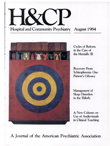A Team Approach to Pharmacologic Treatment of Chronic Schizophrenia
Abstract
The authors describe a therapeutic approach to the pharmacologic treatment of the schizophrenic patient. This team approach relies on interaction between the patient, the patient's family, and the clinician, and helps to eliminate blaming behavior that often demoralizes all parties involved. The authors maintain that neuroleptic therapy can control the positive symptoms of scbizopbrenia. However, they point out that neuroleptics may cause side effects and may interfere with improvement in negative symptoms and interpersonal relationships. The authors suggest that reduced-dosage strategies may prove the most effective way to prevent relapse, while minimizing the side effects of neuroleptics.
Access content
To read the fulltext, please use one of the options below to sign in or purchase access.- Personal login
- Institutional Login
- Sign in via OpenAthens
- Register for access
-
Please login/register if you wish to pair your device and check access availability.
Not a subscriber?
PsychiatryOnline subscription options offer access to the DSM-5 library, books, journals, CME, and patient resources. This all-in-one virtual library provides psychiatrists and mental health professionals with key resources for diagnosis, treatment, research, and professional development.
Need more help? PsychiatryOnline Customer Service may be reached by emailing [email protected] or by calling 800-368-5777 (in the U.S.) or 703-907-7322 (outside the U.S.).



